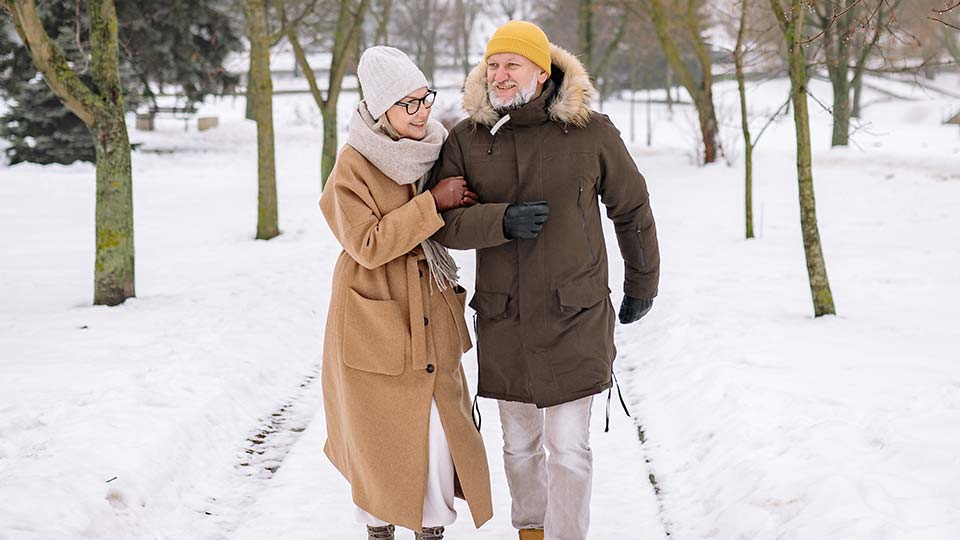We’ve put together a six-step guide to practising self-care for your ears this winter.
1.Bundle up!
It’s important to keep your body warm in the wintertime to help your immune system fight off potential colds and viruses, so don’t forget to wrap up!1,2Ears are more prone to infection if you have an upper-respiratory cold or flu. An ear infection occurs when the Eustachian tube in the middle ear is blocked by fluid and/or inflammation, which allows a viral or bacterial infection to develop in the middle ear.3Although children are more likely to develop ear infections for several different reasons, such as having smaller Eustachian tubes and under-developed immune systems, adults are susceptible too.4
2. Use ear protection
While bundling up, don’t forget a warm hat, headband, or earmuffs for your ears!
Since our ears are mostly made of cartilage and barely any fat, they hardly have any insulation. This is why ears, along with noses, get cold more quickly than other parts of your body.
Frequent exposure to the cold without ear protection may increase your risk of hearing loss. This is because your body may react to this exposure by increasing bone growth in the ear canal in order to “block out” the cold.5 This additional growth is called exostosis. It’s common among skiers, snowboarders, and surfers who are exposed to cold temperatures and/or cold water. Even if it doesn’t seem that cold, it’s actually advised to wear hats or earmuffs at temperatures of around 15°C (59°F) or lower. While this may not seem very cold, this is the temperature in which your blood vessels start to constrict in order to conserve warmth, making your ears more susceptible to the cold weather.6
Along with keeping your ears warm during the chilly winter months, remember to shield them from loud noises as per usual. If it snows and you use a snowblower/snow thrower, be mindful. Exposure to sounds around 70 decibels over a period of time can start to damage our hearing,7 and snowblowers can generate sounds over 90 decibels.8
3. Look after your immune system
We know that colds and upper respiratory infections can lead to (painful) ear infections, so it’s important to keep your immune system healthy to help prevent the chance of developing one.
Nutrients that support your immune system, such as vitamin D, C, zinc, and probiotics, can be great additions to a balanced diet, especially during cold and flu season, as can increasing your fruit and vegetable consumption, fibre, hydration, and making exercise and rest part of your routine.9 Be mindful of reducing your stress as well – chronic stress can be an immune suppressant.10
Speak with your doctor, healthcare professional, and/or nutrition expert to see if you’re getting what you need to keep your immune system running as it should.
4. Keep them dry
Winter means more rain and snow in the UK.
Excessive moisture can get in the ear and create the perfect environment for bacteria to flourish, leading to ear infections.11 Make sure you gently clean just around the opening of the ear canal once a day with a cloth, especially after showering or bathing (and winter swimming, if you’re into that!). Avoid using cotton swabs/buds as these often do more harm than good.
If you’ve got water in your ear making it feel clogged, you can tilt your head to the side while gently pulling your earlobe down or lie on your side on a pillow covered with a towel to help it drain. You can also use a hairdryer on low heat and speed to help dry out the canal. Contact your doctor or a healthcare professional if you’re worried about clogged ears.12
5. Show your hearing aids some extra love
Condensation can also form easily in the winter as we move from the cold outside to the warm indoors. This excess moisture can potentially damage your hearing aids. Wearing a hat, headband or earmuffs over your ears when you’re outside in the cold can help protect your hearing aids from moisture.
When you come inside from being out in the cold, open the battery compartment to air your hearing aids out, allowing any excess moisture to evaporate. You can also leave your hearing aids out of their case overnight.
6. Talk with a hearing care expert
Sources:
1 – Foxman, E. F. (2016, July 26). Two interferon-independent double-stranded RNA-induced host defense strategies suppress the common cold virus at warm temperature. PNAS. https://www.pnas.org/content/113/30/8496.full
2 – Warmer body temp puts the heat on the common cold. (2016, July 11). YaleNews. https://news.yale.edu/2016/07/11/warmer-body-temp-puts-heat-common-cold
3 – Ear infection (middle ear) - Symptoms and causes. (2021, June 23). Mayo Clinic. https://www.mayoclinic.org/diseases-conditions/ear-infections/symptoms-causes/syc-20351616
4 – Ear Infections in Children. (2017, May 12). NIDCD. https://www.nidcd.nih.gov/health/ear-infections-children
5 – Fowler, E. P., Jr MD. (1942, October 1). NEW BONE GROWTH DUE TO COLD WATER IN THE EARS. JAMA Otolaryngology–Head & Neck Surgery | JAMA Network. https://jamanetwork.com/journals/jamaotolaryngology/article-abstract/571733
6 – Hear us out! Why you need to keep your ears warm this winter. (2018, December 26). MedExpress. https://www.medexpress.com/blog/workplace-wellness/why-you-need-to-keep-your-ears-warm-this-winter.html#:~:text=Similar%20to%20the%20nose%2C%20ears,faster%20than%20other%20body%20parts
7 – What Noises Cause Hearing Loss? | NCEH | CDC. (2019). CDC. https://www.cdc.gov/nceh/hearing_loss/what_noises_cause_hearing_loss.html
8 – Bergmann., B. L. W. I. B. A. (2019, January 10). The Science of Sound: How the Products You Use Every Day Are Engineered for Your Ears. Consumer Reports. https://www.consumerreports.org/hearing-ear-care/the-science-of-sound-how-the-products-you-use-every-day-are-engineered-for-your-ears/
9 – Nutrition and Immunity. (2021, January 27). The Nutrition Source. https://www.hsph.harvard.edu/nutritionsource/nutrition-and-immunity/
10 – Segerstrom, & Miller. (2004). Psychological Stress and the Human Immune System: A Meta-Analytic Study of 30 Years of Inquiry. NCBI. https://www.ncbi.nlm.nih.gov/pmc/articles/PMC1361287/
11 – Swimming and Ear Infections | Healthy Swimming | Healthy Water | CDC. (2020). CDC. https://www.cdc.gov/healthywater/swimming/swimmers/rwi/ear-infections.html
12 – Tips to Help You Get Water Out of Your Ears. (2017, September 21). WebMD. https://www.webmd.com/cold-and-flu/ear-infection/get-water-out-of-ear

